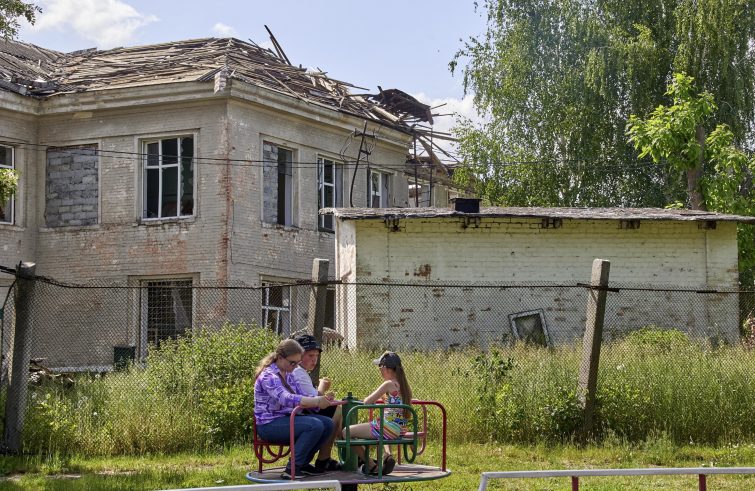
“Based on official figures, more than 3 million children in Ukraine are still living in conflict zones in the country, and we have not been able to evacuate them. Nearly 2 million children face imminent starvation. And this is taking place in a country in the heart of Europe. Once considered the ‘bread basket of Europe’, it is now a land where millions of people face acute hunger. Human insanity breeds war and famine.” H.B. Sviatoslav Shevchuk, Major Archbishop of Kyiv, stressed the plight of children, the first victims of Russia’s armed attack on Ukrainian soil, last evening, connected online with the International Forum of Catholic Action (IFCA) that proposed a meeting for reflection and prayer to end the conflict in Ukraine on the eve of the Feast of the Exaltation of the Holy Cross and coinciding with Pope Francis’ journey to Kazakhstan, in harmony with the Churches of Europe. One hundred people followed the meeting from more than 20 countries connected online from Africa, Asia and America. Lebanon, Syria, Iraq, Myanmar, Sri Lanka, Bangladesh, Taiwan, Palestine and many parts of the African and American continents. “Many of our brothers and sisters are victims of violence and war,” recalled the IFCA Secretary Rafael Corso. “The weakness of international organisms and of the UN diminishes the impact of concrete actions to be put in place in order to mitigate the acts of the tyrants. We thus need to perfect and strengthen our institutions in order to help the human family grow in universal fraternity. We are living in a world of enclosures and violence. We wish to offer a path of hope and of lasting and real peace so as to give life to a world of peace and openness to all of humanity.” The head of the Ukrainian Greek Catholic Church described himself as a “humble spokesman of a suffering people.” “Never would I have imagined to see with my own eyes the capital of my homeland in flames, with missiles fired by the Russians against civilians,” he said. “Never would I have imagined that I would see people tortured and shot in mass graves, entire towns and villages destroyed, razed to the ground. A land known as the “breadbasket of Europe” throughout all its history, has now become a land of humanitarian catastrophe.”
The ‘numbers’ of war. The Archbishop went on to present some “numbers” that describe what is happening in his country today. In the period from February 24 to September 7 this year, over 12 million refugees from Ukraine have crossed borders into neighbouring countries, according to a report by the UN refugee agency, UNHCR. More than 9.8 million civilians have entered EU countries. More than 4 million Ukrainians have sought temporary protection in the EU and more than 7 million Ukrainian citizens have been registered (also in EU countries) as refugees. The Ukrainian Ministry for Social Affairs estimates that there are now 4.5 million internally displaced persons in the country.
If we add up these figures, almost 18 million people have been forced to leave their homes, “people whose history has been erased by the war.”
Official figures indicate that more than 130,000 buildings in Ukraine have been destroyed, meaning that 3.5 million people are left without a place to return to because their homes are no longer there. 4.5 million people no longer have free access to drinking water because the Russians systematically destroyed the cities’ life-supporting infrastructure. Water is polluted in many combat zones. More than 5,500 civilians were killed and about 9,000 wounded, according to official reports. But this figure does not correspond to reality,” the Archbishop points out. More than 200,000 civilians were killed in the city of Mariupol alone. They are now lying in mass graves or have not been given a proper burial. “Behind these numbers”, remarks Shevchuk, “I see women, children, elderly people.”
The nuclear threat. Missiles, rockets, bombs and artillery are fired every day. “Russia continues destroying our land, but now the nuclear power plants we have in Ukraine are the biggest threat that is worrying the whole world.” His Beatitude expressed his grave concern, notably over the situation at the Zaporizhzhia nuclear power plant, which “has fallen into Russian hands and poses a great threat that could flare up at any moment.” He denounced: “The Russian Army converted this nuclear power plant into a weapons warehouse and torture chamber. The need to demilitarise this power plant has been called for many times, but nothing has happened. On the contrary, Russia has stated that it is ready to attack the other nuclear power plants in Ukraine. However, should this happen, Ukraine, a land known for the Chernobyl disaster, will be the stage of a much more serious catastrophe.
If Russian missiles destroy these plants, Ukraine risks becoming a wasteland. This is proof of how far human madness can go today.”
“We have to extend our gaze to the faces of the suffering men and women of our times,” says Shevchuk, “and not be afraid to touch the wounds, the sorrows, the tears of the Ukrainian people, knowing that many people are suffering from war in the world today. It is hard, if not impossible, to express all the pain and suffering with human words. We hear again today the cry of Jesus crucified, ‘My Father, why have you forsaken me?’.” “But the Ukrainian people resist, fight and pray. Our faith is the source of our hope. If you look at Ukraine with human eyes, you will weep. But if you raise your eyes and contemplate the Cross, you will rejoice. For it is from the Cross that the source of life will be brought to us. For us, this Cross that is being raised today, in Ukraine, is the root of the tree of life.”











